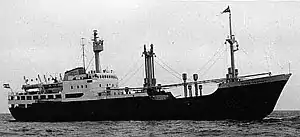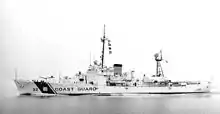MS Hans Hedtoft
MS Hans Hedtoft was a Danish liner that struck an iceberg and sank on 30 January 1959 on her maiden voyage off the coast of Western Greenland.[1] The only piece of the wreckage ever found was a lifebelt. As of 2021, she remains the last known ship sunk by an iceberg with casualties.
 MS Hans Hedtoft | |
| History | |
|---|---|
| Name: | Hans Hedtoft |
| Namesake: | Hans Hedtoft |
| Owner: | Royal Greenland Trading Company |
| Builder: | Frederikshavns Værft, Frederikshavn |
| Yard number: | 226 |
| Launched: | 13 August 1958 |
| Completed: | 17 December 1958 |
| Maiden voyage: | 7 January 1959 |
| Out of service: | 30 January 1959 |
| Homeport: |
|
| Identification: |
|
| Fate: | Sank, all hands lost |
| General characteristics | |
| Tonnage: | |
| Length: | 82.65 m (271 ft 2 in) |
| Beam: | 14.17 m (46 ft 6 in) |
| Depth: | 6.43 m (21 ft 1 in) |
| Capacity: | 60 passengers |
| Crew: | 40 crew |
| Armament: | 3 × 40 mm anti-aircraft guns |
Description
Hans Hedtoft was 82.65 metres (271 ft 2 in) long, with a beam of 14.17 metres (46 ft 6 in) and a depth of 6.43 metres (21 ft 1 in). She was assessed at 2,875 GRT, 1,368 NRT.[2]
Hans Hedtoft was built by Frederikshavns Værft at Frederikshavn in northern Denmark. She was yard number 226, launched on 13 August 1958 and completed on 17 December.[3] She had a double bottom and seven watertight compartments and an armoured bow and stern. She was designed to provide a year-round service between Denmark and Greenland. Like the RMS Titanic, Hans Hedtoft had a riveted hull, a feature which was criticised by Knud Lauritzen, a shipowner. Lauritzen claimed that a riveted hull was not as resistant to ice pressure as a welded hull.[1] Hans Hedtoft had the Code Letters and radio callsign OXKA.[4] The ship was named for a former prime minister of Denmark.
The ship was armed with three 40 mm anti-aircraft guns, on the orders of the Danish Ministry of Defence (MoD). The armament was not part of the original plans, and the ship was strengthened in three places to take the guns. An ammunition room was built into the bow of the ship. The MoD provided the anti-aircraft guns free of charge. Although fitted during tests, the guns were dismounted and carried aboard Hans Hedtoft at the time of her sinking. An order had been issued that the guns were to be removed from the ship immediately after she arrived back in Copenhagen. It was claimed that the arming of Hans Hedtoft resulted in a warship being constructed without the approval of the Folketing.[5]
Sinking
Hans Hedtoft sailed from Copenhagen on her maiden voyage on 7 January 1959. Her voyage to Julianehaab, Greenland, was made in record time. Hans Hedtoft called at Nuuk, Sisimiut and Maniitsoq before returning to Julianehaab.[5]

On 29 January, she began her return journey.[6] The ship had 40 crew, 55 passengers and a cargo of frozen fish on board[1] and in addition to that 3,25 tons of archives concerning Greenlandic history.[7][8][9] One of her passengers was the Danish parliament (Folketing) member Augo Lynge.[5] The next day, Hans Hedtoft collided with an iceberg about 35 nautical miles (65 km) south of Cape Farewell, the southernmost point of Greenland.[6] A distress call was given at 13:56 (local time) stating that the ship had hit an iceberg at 59°30′N 43°00′W.[5] The call was answered by the USCGC Campbell, the West German trawler Johannes Krüss[1] of Bremerhaven[5] and another West German trawler. Within an hour, another message was sent stating that the engine room was flooded.[1] At 15:12, it was announced that the ship was sinking. A final message was sent at 17:41 stating the ship was slowly sinking and requesting immediate assistance.[5] Aircraft in Newfoundland were grounded by the weather and unable to assist in the search for Hans Hedtoft.[1] The beginning of an SOS was received by Johannes Krüss at 17:41 after which communication with Hans Hedtoft was lost.[5] On 31 January, USCGC Campbell reported that conditions were the worst seen and there was no sign of Hans Hedtoft or her passengers and crew.[10] The search was called off on 7 February.[6] The only piece of wreckage ever recovered was a lifebuoy which washed ashore on Iceland and discovered on 7 October 1959, some nine months after the ship sank.[5] The ship sank with parish registers from parishes of Greenland, which were meant to be deposited in archives in Denmark, causing a major loss for Greenlandic genealogy.[11]
As a result of the sinking, the airfield at Narsarsuaq, Greenland, which had closed in November 1958, was reopened.[12] An appeal fund for the relatives of the victims was opened. Kr40,000 (then £2,000) was raised amongst ten countries in two months.[13] Compensation for the relatives amounted to Kr1,184,936 (then £59,000).[14] Like the RMS Titanic, Hans Hedtoft was said to be the safest ship afloat,[1] being described as "unsinkable" by some.[5]
Legacy
On 30 January 2005, Queen Margrethe unveiled a monument at North Atlantic Wharf, Copenhagen, to the 95 people lost on Hans Hedtoft.[15]
The shipwreck is the theme of the 2014 song "All Hope Abandon" by the Greenlandic band Small Time Giants.[16]
References
- "Little Titanic (1 of 2)". Time. 9 February 1959. Archived from the original on 28 February 2017. Retrieved 29 April 2020. (subscription required)
- "Danmarks Skibsliste 1959" (PDF) (in Danish). Sjøfartens Bibliotek. Archived from the original (PDF) on 18 March 2012. Retrieved 30 January 2012.
- "5613846". Miramar Ship Index. Retrieved 4 November 2009.
- "Der Untergang der "Hans Hedtoft" / OXKA (I)" (in German). seefunknetz.de. Retrieved 12 December 2008.
- "The ship – lost on its maiden voyage". qaqortoq.gl. Archived from the original on 11 February 2009. Retrieved 12 December 2008.
- Eastlake, Keith (1998). Sea Disasters. London: Greenwich Editions. p. 24. ISBN 0-86288-149-8.
- "Grønlands arkiver sank sammen med "Hans Hedtoft"". kristeligt-dagblad.dk. Retrieved 31 January 2019.
- Lastmanifest of 6th February 1959: Vedr. Godthåbslastens placering i m/s "Hans Hedtoft"
- "'Hans Hedtoft's forlis var en katastrofe for Grønlands kulturarv". politiken.dk. Retrieved 31 January 2019.
- "Little Titanic (2 of 2)". Time. 9 February 1959. Retrieved 12 December 2008.
- "Home". Archived from the original on 16 May 2016.
- "History". iserit.greennet.gl. Archived from the original on 12 December 2008. Retrieved 12 December 2008.
- "Telegrams in Brief". The Times (54416). London. 23 March 1959. col G, p. 9.
- "Telegrams in Brief". The Times (54633). London. 2 December 1959. col D, p. 11.
- "Memorial to Hans Hedtoft victims". Copenhagen Post. Archived from the original on 10 August 2007. Retrieved 12 December 2008.
- Mats Bjerde (8 May 2017) En gedigen gang Grønland Gaffa.dk
External links
- Projekt Hans Hedtoft 1959–2009 (in Danish)
- Overview and pictures (in Danish)
- LIFE Magazine Feb. 16, 1959